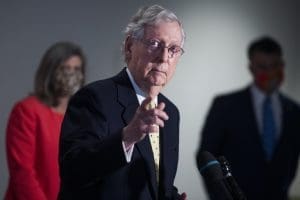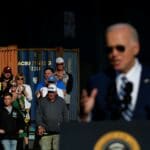McConnell doesn't care if Trump wants more COVID relief — it's not happening
The Senate majority leader continues to offer legislation that falls far short of what Democrats say is necessary to adequately help people.

Donald Trump on Thursday demanded a COVID-19 relief bill of more than $1.8 trillion, saying “go big or go home” — days after rejecting any sort of pandemic relief deal at all.
Minutes later, Senate Majority Leader Mitch McConnell rejected Trump’s demand, indicating he instead planned to stick with his own $500 billion skinny relief bill.
Trump told Fox Business on Thursday that he would “absolutely” raise the $1.8 trillion that Treasury Secretary Steve Mnuchin made to House Speaker Nancy Pelosi last week. “I would because this was not caused by our workers and our people,” he explained. “China will pay us back in one form or another.” Trump has frequently made baseless claims that other countries will magically fund U.S. spending.
The comments came just days after Trump said that no deal at all was necessary to address the pandemic and its economic ramifications.
“I have instructed my representatives to stop negotiating until after the election when, immediately after I win, we will pass a major Stimulus Bill that focuses on hardworking Americans and Small Business,” Trump tweeted on Oct 6. “Our Economy is doing very well. The Stock Market is at record levels, JOBS and unemployment also coming back in record numbers. We are leading the World in Economic Recovery, and THE BEST IS YET TO COME!”
Thursday’s jobs numbers contradict those claims, with 898,000 new unemployment claims filed just last week.
Shortly after Trump’s interview Thursday, McConnell (R-KY) told reporters that he was not interested in passing more than the $500 billion “skinny bill” that has been stalled in the GOP-controlled Senate for weeks.
“What I will put on the floor is a highly targeted half a trillion dollars, that’s a lot of money,” he vowed. “I’m putting on the floor what we think is appropriate to tackle the disease.”
Asked if he would consider a bill in the $1.8 trillion to $2.2 trillion range, McConnell said he did not think so: “That’s where the administration’s willing to go. My members think what we laid out, a half a trillion dollars, highly targeted, is the best way to go.”
McConnell’s office did not immediately respond to an inquiry for this story.
House Democrats passed a $3 trillion relief bill in May, with funds to address the pandemic and the economic meltdown. McConnell refused to even give it a vote in the Senate, calling it “not serious.”
The House Democratic leaders later proposed a $2 trillion compromise, but that too was rejected.
McConnell has bragged about his decision to do nothing for months, calling it “the reasonable thing to do” because it “allowed us to learn the coronavirus didn’t mysteriously disappear.”
Senate Minority Leader Chuck Schumer said in September that the GOP’s half-a-trillion proposal was “emaciated” and “completely inadequate” for the nation’s needs. It omits unemployment protections for essential workers facing hazardous pandemic conditions and the funds needed by states and localities to continue their core functions.
Trailing in the polls, Trump seems to want to at least look like he is pushing for more than the Republican bill. But in recent weeks, Senate Republicans have made it clear that they have no interest in playing along.
“I think politically the president still benefits from maybe asking for more but I think that was pretty clear that that was voted upon by 52 senators,” Sen. Mike Braun (R-IN) told Politico last month. “You’d lose a bunch of fiscal conservatives if you did anything other than what we voted on for last week.”
“We did the right thing,” agreed Sen. Ron Johnson (R-WI). “The president has his opinion, we have ours.”
Published with permission of The American Independent Foundation.
Recommended

President Biden visits Prince William park to talk solar, youth involvement on Earth Day
Virginia set to receive $156 million from U.S. Environmental Protection Agency program
By Charlie Paullin, Virginia Mercury - April 23, 2024
Texas governor and attorney general do little to curb state’s chemical plant crisis
Republicans Greg Abbott and Ken Paxton have taken thousands of dollars in donations from chemical companies and their affiliated PACs.
By Jesse Valentine - December 08, 2023
‘We’ve been waiting for this’: Union workers cheer Biden’s hydrogen hub plan
Federal funding for the hub is estimated to bring over 20,000 jobs to the Pennsylvania-New Jersey-Delaware area.
By Anna Gustafson - October 17, 2023







































































